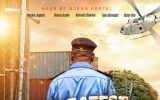As part of YNaija’s dedication to the arts and especially literature from Nigeria and the continent, we have opened our platform to novelists and poets and creative non-fiction writers, to share with us an integral part of their work and give us some much needed insight into why they have chosen to express themselves through this form.
Writer and photographer Morayo Kolesho is our debut feature, and she offers her very first memoir, “Hernortherstory” which chronicles her year serving the nation as part of the Nigerian Youth Service Corps. Dealing with diversity, culture shock and the beauty of immersing one’s self in new cultures, Morayo’s book is an important new perspective on a practice that has raised much discussion. We hope you will find it as interesting we had.
******
It was funny that the Mallam Aminu Kano airport was located on Lagos Road, Kano. I rolled out my trolley hastily. The first thing I noticed was the ‘northern perfume’ or smell, a very strong incensed scent that most of the northern folks wore. I later learnt it was called the Arabian oud. I did not like it. The second thing was the most intense heat we all struggled with, I shrugged and looked forward to sitting in a cab where I could chill out and sleep as we zoomed off to camp.
“Whey you dey go?” the small group of cabmen fought for my attention as I fumbled with the printed call up letter to
check the address of my camp.
“Em, Karaye, Kusala Dam,” I replied as though asking a question.
“Pipteen tousan,” one of the cabmen answered.
I quietly rolled my trolley away.
“COME BACK NAU,” he shouted but I ignored the call and continued towards a group of people that had gathered
around the corner, assuming they were corps members too because of their dressing.
I spotted Lydia in a mini group and happily cried, “LYDIA”.
She turned and smiled, “Hi Morayo,”
“Hi Lydia,”I answered weakly, still ruminating on the cab fare I just heard.
“Pele, how much did those guys tell you?”
“15k o, what did they tell you,” I asked.
She laughed and calmly replied, “I think we should just walk out of this airport, you know the way these airport cab fares can be everywhere.”
What a good natured soul, I thought and nodded in agreement.I sighted another friend from Lagos, Marilyn, she was with two other ladies and they were also walking away. Surprised, Lydia and I hurried to join them.
“ARE YOU SERIOUS? MORAYO. YOU’RE ALSO HERE”,
Marilyn said as we caught up with them.
“Yeah, I did not know you were posted to Kano too o. Oh yes, meet Lydia”, I replied and Marilyn introduced us to her
companions as well, Monji and Mariam.
Monji’s uncle lived in Kano and had recommended Mr Alex, a cabman to take her to camp. He would have taken her personally if he was not out of town.
“Wonderful,” I thought as we teamed up and moved on quietly. We had not gone too far when Monji spoke up, “I think this is the UBA car park Mr Alex asked us to wait at”, as she pointed to the UBA bank ahead of us. We walked into the car park and searched for a shaded spot but found none. I took in the environment a bit more, the whole area seemed wide and sparse in structure and vegetation (so sparse, we did not find a single shaded spot). The
weather was also oppressively hot and drying. I adjusted my large multicoloured scarf again, feeling uncomfortable in it this time and noticing that I was the only one with a scarf on in the small group.
“Ah, this Kano sun is not funny o,” Mariam went. Her comment cracked us all open. from then we chatted like we had known each other way longer. It was a relief to know that we were not all bricks after all. We decided to search or much needed shade and drinking water. On our ‘journey’, we learnt our first real northern words “ruwa mai sanyi,” from the one of the shop owners we had patronized.
“You people be corper abi,” the shop owner said with her Eastern Nigerian accent. We gave a quick nod, surprised we
could find an Easterner, so comfortably settled on Northern grounds.
She smiled, “No mynd this heat o, Kano na good place, but hin hot weh weh sha. Take –”, she said and handed us very cold bottles of water, which we collected very gratefully and paid for. “When you need kol-wota, just talk say ‘ruwa mai sanyi’ you wan buy.” She continued.
“RUWA MAASE–” we jokingly repeated.
Ehn o, ruwa mai sanyi”, she smiled like a satisfied teacher.
We waited a little while longer before Mr Alex finally came along in a grey Honda Civic. We did another quick buy of the ruwa mai sanyi before getting into his car.
Monji sat down at the front seat while the four of us squeezed into the back. Both she and Mr Alex got along really quickly, talking mostly about her uncle, until he asked her where we said we were going again. Gratefully, she had already established that the group’s budget for the ride to the camp was two thousand and five hundred naira, which Mr Alex happily agreed to, much to our surprise and gladness.
“NYSC Orientation Camp. Karaye, Kusala Dam,” Monji said.
“EHN? KARAYE TOO FAR O, ABEG, WHEN NYSC MOVE FROM UNGOGO NAU, AH,” he hastily replied, his Igbo accent thickening.
Apparently the former NYSC orientation camp site was much closer to the airport at a place called Ungogo. But it
moved a few years before then to a much farther site called Karaye.
“So, are we now paying you more than the N2500 we agreed,” Monji said, looking back at us.
“That no even be my consyn now. Infact sef, I no fi even take una go that kind journey, e go just spoil my market for today, mbanu.”
“Was it really that far?” I wondered.
The time was just about 10:00am. Two hours in Kano seemed like a lifetime already. I pitied the other corpers who had travelled to Kano by road from Lagos, 14 hours and then a share of this? My body was already beginning to ache.
“You know what, I go take una go park and you go pay me, settled?” Mr Alex interrupted my thoughts with his suggestion and conclusion.
We wanted to speak but had nothing else to say. What or where did we know? We were in a foreign land on a funny
mission to report to a foreign camp or face some funny consequences. We simply had nothing to say. We rode along dry and rough roads; I wiped layers of dust off my glasses at intervals and wondered what our skins were enduring. Every now and then, I’d look outside and analyse my environment, the further in we got, the more people we
saw and the more northern and rural, like an ancient movie, everything seemed.
There were rarely women on the streets though, and when we did see them, they were covered from head to toe with
long flowing scarves and traditional attire; the men adorned their slim frames with long kaftans and their heads with small but craftily detailed caps. Nobody seemed to wear western clothes, not even the youngsters wore jeans!
Bored stiff, my attention shifted back to the interesting and multilingual Mr Alex, he was an interesting man, very business minded though. I gathered that from our little trip thus, as he chatted, smiled and laughed only when necessary. He had also successfully maneuvered his way through the “many” roadblocks we had encountered, speaking fluent Hausa to each set of police officers we passed by. The journey had stretched for almost 45 minutes and I began to wonder if Mr Alex had changed his mind and was actually taking us to Karaye when suddenly, everything got quiet. Mr Alex turned off the ignition, jumped down hastily, jammed his door, dusted his jean trousers and walked off into a dirty garage or mechanic workshop, filled with rickety vehicles of all sorts. He stood out from the passers-by with his worn red face cap, grey t-shirt and jean trousers. Everything felt hazy and Mr Alex faded into the smokey and rusty looking garage in front of us.
Monji quickly asked us to contribute N500 each before he returned. With uncertainty plastered on all faces, hers included, we bunched up the money. He came back not too long after and said, “oya, come down ladies, I don negotiate with the driver, he will take you to Karaye for N500, give me my own N2k – OYA, SHARP SHARP
NAU,” he urged us and we hesitantly collected ourselves to leave his cab. He hurried us off into a waiting rickety bus with a driver and conductor that fitted the bus scene – they did not understand an ounce of English and they smiled so very much we hoped we were safe. Collecting the N2500 from Monji and handing her back N500, he shoved us all into the bus and bade us goodbye.
“Mr Alex…” Monji doubtfully called as he walked off into thedistance.
“Don’t worry, you will be fine”, he waved again and finally disappeared. He had finished his own side of the bargain and I wondered if we would ever see him again. The journey to the camp seemed to take forever and to think
it cost just 100 bucks per person was mind boggling! In any case, it was cheap but it was not fun; the driver kept picking and dropping passengers at almost every stop. If that was all, I would have been quiet but then we were made to sit most unfairly, I guess that justified the bus fare. Instead of the usual four persons per row in a regular bus that size, we sat six! Worse still was the first row, where Lydia and I sat next to four other passengers. Directly facing us was another row of four passengers who had been collectively squeezed on the bus’s engine extension. Those who have at one time boarded the local small bus in any part of Nigeria will understand better. The space in between us was barely existent, it was no small fight for leg space but we managed still.
Moving on, we figured with time that northern people were religious even in their vehicles, their women sat on one side nd their men sat on the other, neither mixing except at the border or at the middle. For some reason, no local woman wanted to seat close to ‘us’, we were foreigners, and most likely infidels or whatever else. We did not want to sit close to them either; they had an unappealing rustic look and smell, so we took a row close to the men, who did not seem to mind very much. We had no choice with the look and smell after all.
Midway, I picked a fight with a teenage boy sitting in front of me with his dripping piece of mango. He had sores all over his leg and I had made a conscious effort to reduce our physical contact but he somehow thought I was creating more space for him to spread his sorely legs. I endured this for a while and watched him suck rabidly with his
entire mouth at the huge and ripe piece of mango. The mango so huge, he had to support it with his other hand and it was so ripe, it burst to an overflow with salivary yellow syrup. I looked away, disgusted, then again slightly moved my leg away from his. I had the last straw when one of his lickings dropped on me. Very suddenly, I violently pushed off his leg with a stern and warning look.
His mother, who sat behind us, retaliated by ranting curses in Hausa and then he joined. Her voice was unlike the other Hausa women’s I was used to hearing while growing up, theirs was much sweeter. My hairdresser who lived close to our house in a little shop with her family was from the north. My mother and many other mothers patronized her and her friends faithfully because they were uniquely gifted in the art of natural hair making. One thing I particularly enjoyed asides from their therapeutic hands was their conversations. It was dulcet but not weak, high but not loud, it was a musical art.
But this particular woman sounded off. Her voice was not music; it was loud, it was scattered, it was angry and it was hard to ignore. I looked out the window, grateful they were by my side at least. My new friends also pacified me.
After a while the teenage boy stopped and moved away his legs but his angry mother persisted, thankfully, only in words. She seemed offended we were not responding to her, she assumed we could speak her language and were choosing to ignore her. I put up a face but I was glad they were a naturally peaceful people because I was beginning to fear the worst. In the midst of the commotion new words were learnt, “Haba hajia” and some “Kawai Turenchi, bah Hausa”.
I least expected the laughter that soon shook the whole bus as the conductor continued to explain that we were foreigners, corpers, and could not hear nor speak an ounce of Hausa. The passengers gave us a queer look and then a, “Wallahi?” like, “are there still people on this earth who cannot speak Hausa?” Finally, the mother shook her head pitifully and let sleeping dogs lie.
Was it not strange we wondered similar about them too? In any case I was grateful I had been so quickly forgiven and hoped the journey would end shortly.
After about another hour, at about 12:00 pm, we saw a road sign opposite the one we were on, that read, NYSC ORIENTATION CAMP 30KM AHEAD. We halted the bus, paid our fares and hurriedly crossed over to the other side to meet the waiting motorbikes to take us to our final destination, finally, the Karaye NYSC Orientation camp.
My bike man had already started rapping Hausa at me probably because of my scarf before I did a hasty, “BAH HAUSA O.” He laughed and carried on, wobbling us down very hilly paths. In time, I lost sight of my new friends. I do not know how.
******
This had to be a dream, and a really bad one at that. All this loud whistling and scampering feet, the thin darkness
and the fear that sliced through it, and the awfully cold weather.
I shifted uneasily under my flimsy cover. The loud whistling continued heightening, and so did the sound of the footsteps in the dark room.
Suddenly, the lights came on and an angry command rang from a distance, “DON’T LET ME MEET YOU ON THAT BED O, GET OUT NOW!”
I remembered then with a sap of strength – I was in the NYSC camp, Karaye, Kusala Dam.
Lydia whispered from the next bunk as she jumped down hurriedly, “Morayo, get up before they come”.
I slipped my hand under the pillow to reach for my phone. It was barely 5:00am and I so badly wanted to sleep, in any case I jumped down too and wore the clothes I had set aside from the day before, joining the other scampering feet.














